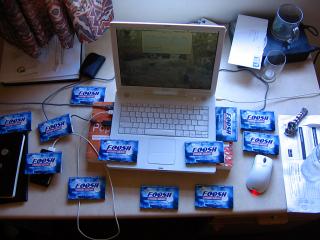Wadham just replaced most of the computers in our lab with brand new HP 2.13 GHz Core 2 Duo machines, complete with new keyboards and monitors. This strikes me as pretty wasteful, given that the previous machines were completely adequate for web browsing and word processing – the only tasks for which the computers in the lab are ever used.
The new machines probably cost about £500 each: money that could have been much better spent on scholarships or some other purpose that serves student needs. Having three or four fast computers with Photoshop or similarly resource-intensive software makes sense; buying a dozen high power machines for mundane tasks does not. When running Word and Firefox, the performance difference on the new machines cannot even be noticed.
At least they didn’t upgrade to Vista.

